Barbarians Were People Who Didn’t Speak Greek
Conny Waters - AncientPages.com - Who were the Barbarians? The term “Barbarians” is misused today. In modern times, we often say Barbarians are uncivilized people or evil people.
However, the true meaning of the word has been forgotten. The word originated in ancient Greece and initially referred to people who did not speak Greek.
A preconnesian marble depiction of a barbarian. Second century AD. Barbarian, so-called Dacian prisoner, Roman artwork. Image credit: Marie-Lan Nguyen - CC BY 2.5
Those of relatively advanced civilizations used the term to describe others considered less civilized. It referred to people from more primitive cultures who usually relied on physical strength more than intellect.
According to Strabo (64 BC - 21 CE), a Greek geographer and historian, people known as Carians, of all the “barbarians,” had a particular tendency to intermingle with the Greeks.
“This was particularly the case with the Carians, for, although the other peoples were not yet having very much intercourse with the Greeks nor even trying to live in Hellenic fashion or to learn our language ... yet the Carians roamed throughout the whole of Greece serving on expeditions for pay. ... and when they were driven thence [from the islands] into Asia, even here they were unable to live apart from the Greeks, I mean when the Ionians and Dorians later crossed over to Asia.” (Strabo 14.2.28)
Today, “barbarian” has another meaning and is used to describe someone using excessive violence without considering other options.
According to Konstantinos Vlassopoulos, a professor of Greek history at the University of Nottingham, the earliest attestation of the word barbarian in Greek literature is in Homer’s descriptions of the Carians as ‘barbarophonoi.’
Vlassopoulos notes that the ancient Greeks used this word in a confusing and contradictory fashion.
They had no agreement among the ancient Greeks regarding who spoke Greek and who didn’t, at least until Alexander the Great.
There “existed a variety of local and regional dialects, which were mutually comprehensible to a larger or smaller degree,” writes Vlassopoulos in his book “Greeks and the Barbarians.”
So, the original meaning of the word “barbarian” did not refer to acts of evil but to those who were not Greek or did not speak Greek. Also, who didn’t talk Greek was a matter of debate among the ancient Greeks.
Written by Conny Waters – AncientPages.com Staff Writer
Copyright © AncientPages.com All rights reserved. This material may not be published, broadcast, rewritten or redistributed in whole or part without the express written permission of AncientPages.com
Updated on January 18, 2023
Expand for referencesReferences:
Malcolm Heath. Review of Inventing the Barbarian, by Edith Hall. The Classical Review 41, no. 1 (1991): 90–92.
More From Ancient Pages
-
 Maya Site With At Least 300 Buildings Some Of Which Are Over 8 Meters High – Discovered
Archaeology | Sep 16, 2022
Maya Site With At Least 300 Buildings Some Of Which Are Over 8 Meters High – Discovered
Archaeology | Sep 16, 2022 -
 Archaeological Discovery Of “Once-In-A-Lifetime” Medieval Gold Necklace In Britain
Archaeology | Dec 6, 2022
Archaeological Discovery Of “Once-In-A-Lifetime” Medieval Gold Necklace In Britain
Archaeology | Dec 6, 2022 -
 Extraordinary Viking Boat Burial Of Two People Unearthed In Central Norway
Archaeology | Nov 20, 2019
Extraordinary Viking Boat Burial Of Two People Unearthed In Central Norway
Archaeology | Nov 20, 2019 -
 On This Day In History: Statue of Liberty Arrived In New York Harbor – On June 17, 1885
News | Jun 17, 2016
On This Day In History: Statue of Liberty Arrived In New York Harbor – On June 17, 1885
News | Jun 17, 2016 -
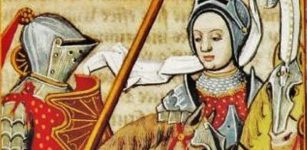 Jeanne de Clisson ‘Lioness Of Bretagne’: Her Black Painted Ships With Red Sails Terrorized English Channel
Featured Stories | Oct 4, 2019
Jeanne de Clisson ‘Lioness Of Bretagne’: Her Black Painted Ships With Red Sails Terrorized English Channel
Featured Stories | Oct 4, 2019 -
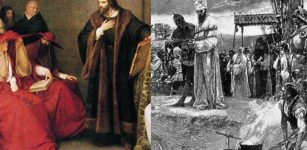 Jan Hus: Czech Reformer And Bohemian Religious Leader Was Burned At Stake For Heresy
Featured Stories | Dec 17, 2019
Jan Hus: Czech Reformer And Bohemian Religious Leader Was Burned At Stake For Heresy
Featured Stories | Dec 17, 2019 -
 Catherine De Medici – Queen Of France Supported Nostradamus, Was Suspected Of Poisoning And Blamed For Horrible Massacre
Featured Stories | Dec 17, 2018
Catherine De Medici – Queen Of France Supported Nostradamus, Was Suspected Of Poisoning And Blamed For Horrible Massacre
Featured Stories | Dec 17, 2018 -
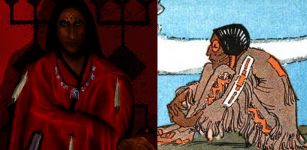 Iktomi – Native American Spider-Trickster Spirit Whose Stories Teach Moral Values
Featured Stories | Jan 28, 2019
Iktomi – Native American Spider-Trickster Spirit Whose Stories Teach Moral Values
Featured Stories | Jan 28, 2019 -
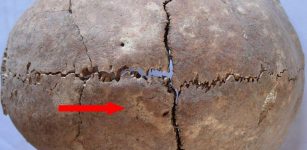 Physical Violence In Ancient Mesopotamia Much Less Common Than Ancient Texts Suggest – New Study
Archaeology | Mar 29, 2017
Physical Violence In Ancient Mesopotamia Much Less Common Than Ancient Texts Suggest – New Study
Archaeology | Mar 29, 2017 -
 Mystery Of The Faceless Creature – Ancient And Modern Sightings
Ancient Mysteries | Jun 19, 2018
Mystery Of The Faceless Creature – Ancient And Modern Sightings
Ancient Mysteries | Jun 19, 2018 -
 Unexplained Accounts Of Mysterious Fires – No Traces But It Happened – Part 2
Featured Stories | Aug 6, 2019
Unexplained Accounts Of Mysterious Fires – No Traces But It Happened – Part 2
Featured Stories | Aug 6, 2019 -
 Qanat Firaun -‘Canal Of The Pharaohs’ Is The Ancient World’s Longest Underground Tunnel
Featured Stories | Mar 10, 2022
Qanat Firaun -‘Canal Of The Pharaohs’ Is The Ancient World’s Longest Underground Tunnel
Featured Stories | Mar 10, 2022 -
 Enigmatic Underground Iron Age Monument At Navan Fort And Its Connection To The Ulster Kings Investigated
Archaeology | Aug 24, 2023
Enigmatic Underground Iron Age Monument At Navan Fort And Its Connection To The Ulster Kings Investigated
Archaeology | Aug 24, 2023 -
 Underwater Archaeologists Explore The Secrets Of Loch Achtily Crannog – Will They Find A Rare Medieval Settlement?
Archaeology | Mar 26, 2025
Underwater Archaeologists Explore The Secrets Of Loch Achtily Crannog – Will They Find A Rare Medieval Settlement?
Archaeology | Mar 26, 2025 -
 Mysterious Ancient Dark Object Hidden In The Colorado Mountains – What Happened To It?
Featured Stories | Jun 17, 2024
Mysterious Ancient Dark Object Hidden In The Colorado Mountains – What Happened To It?
Featured Stories | Jun 17, 2024 -
 Nazar Amulet – Blue Color Wards Off The Evil Eye According To Ancient Belief
Ancient Symbols | Mar 13, 2018
Nazar Amulet – Blue Color Wards Off The Evil Eye According To Ancient Belief
Ancient Symbols | Mar 13, 2018 -
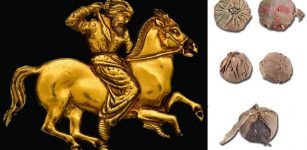 Eurasian Horse Riders Played Ball Games 3,000 Years Ago – Leather Balls Found In Graves Reveal
Archaeology | Oct 12, 2020
Eurasian Horse Riders Played Ball Games 3,000 Years Ago – Leather Balls Found In Graves Reveal
Archaeology | Oct 12, 2020 -
 On This Day In History: George Plantagenet Privately Executed At The Tower Of London – On Feb 18, 1478
News | Feb 18, 2017
On This Day In History: George Plantagenet Privately Executed At The Tower Of London – On Feb 18, 1478
News | Feb 18, 2017 -
 Rare 500-Year-Old Wreck From Missing Ship Samson Discovered In Central Stockholm, Sweden
Archaeology | Dec 20, 2019
Rare 500-Year-Old Wreck From Missing Ship Samson Discovered In Central Stockholm, Sweden
Archaeology | Dec 20, 2019 -
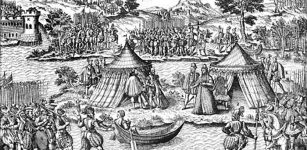 On This Day In History: Edict Of Longjumeau Was Signed And Ended Second War of Religion – On Mar 23, 1568
News | Mar 23, 2017
On This Day In History: Edict Of Longjumeau Was Signed And Ended Second War of Religion – On Mar 23, 1568
News | Mar 23, 2017

